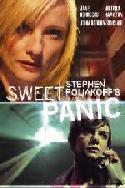SEARCH CurtainUp
REVIEWS
FEATURES
NEWS
Etcetera and
Short Term Listings
LISTINGS
Broadway
Off-Broadway
BOOKS and CDs
OTHER PLACES
Berkshires
London
LA/San Diego
Philadelphia
Elsewhere
QUOTES
On TKTS
LETTERS TO EDITOR
FILM
LINKS
MISCELANEOUS
Free Updates
Masthead
NYC Weather
 London Review
London Review
Sweet Panic
by Lizzie Loveridge
|
God protect my children from being too original.
--- Mrs Trevel |

Jan Horrocks top as Mrs Trevel and Victoria Hamilton as Clare
(Photo: Hugo Glendinning) |
The play, which premiered at Hampstead Theatre seven years ago when some of the critics felt that it might be more suited to film than staging, is a complex theatre piece and not without problems. Overall, it has much to commend it.
. Much of Poliakoff's recent work has been concerned with images, history and the archives, recollection in its various forms as in the BBC serials Shooting the Past, Perfect Strangers and The Lost Prince. His plays for theatre too have reflected this interest. His work has a spellbinding quality, the art of story telling which captures and haunts one's imagination, ideas that your mind cannot help examining again and again. Occasionally some of the themes to which he returns in his writing intrude and detract from the focus of the main story
In Sweet Panic Poliakoff returns to his fascination with the world of subterranean London, the passages that lie unseen under the city with a scene set in an underground car park at Hyde Park. He also touches on an interest in transport with the disappearance of trams and trolley buses and on a more topical theme, the withdrawal of the famous London Routemaster bus, the red double decker which has a conductor on board. Much of the play is about memory and childhood.
But these themes are essentially asides, adjuncts to the main story of Sweet Panic which tells of a child psychotherapist or psychologist, (I'm not sure which) Clare (Victoria Hamilton), who goes away for a weekend without a contact point for the annoying mother of a patient. The disturbed boy goes missing temporarily and his equally disturbed mother (Jane Horrocks), unable to contact her, goes ballistic. She starts a campaign of harassment and stalking targeted at Clare. But Sweet Panic is no mere psychological thriller with a tidy ending. Poliakoff would never write anything that simplistic.
Hamilton and Horrocks are very well matched. Horrocks as Mrs Trevel is from the off, a spoilt, middle class demanding mother. She calls herself "the mother from Hell". Grim faced and tight lipped, her anger is quite sinister. She creeps around the set turning up at awkward moments. Wide eyed Hamilton plays a more sympathetic character although she has little patience and less understanding for Mrs Trevel. The actresses both have distinctive voices: Hamilton breathy and husky, Horrocks hoarse and high pitched. The ensemble are well played but their roles confuse rather than mesh into a whole. Clare's geeky partner Martin (John Gordon-Sinclair), author of a seminal work on the one-man bus seems too boring to interest her. Her secretary Gina (Daniela Denby-Ashe) is coldly efficient but may be resentful. Mr Boulton (Philip Bird) the father of a patient is disaffected. Richard (Rupert Evans) a former patient has the social veneer of success and cure.
The sweet panic of the title is a description of the stress of living in modern society. It is possible that the play is about the lack of difference that psychiatry can make. It could be about the vulnerability of those dispensing "the talking cure." It's hard to say but certainly Clare is reduced to an emotional state by Mrs Trevel. The young clients, we never see but hear them on tape or have them recreated by Hamilton in piping or lisping voice with childlike, fidgetting body language. There is Jess, a teenage girl who walks around London finding inspiration for junk models of famous buildings which should find themselves on exhibit in the Tate Modern. Her models are echoed in Tom Piper's set designs. Perhaps yet another meaning of the play is the conflict between creativity and social conformity with the psychiatric professions as agents of repression.
I am so much looking forward to seeing the film of Sweet Panic. I think that the process comparing the play and the film may be even more interesting that the individual works themselves. Both are records of the same events, one told on live stage, one filmed. The scene in the car park has to work better on film. How do they differ? What emphasis results from the medium? How will Poliakoff film the children here played by Victoria Hamilton? How will he handle the flashbacks to Clare's childhood in Bradford? Fascinating.
| Sweet Panic
Written and directed by Stephen Poliakoff Starring: Jane Horrocks and Victoria Hamilton With: Philip Bird, Daniela Denby-Ashe, John Gordon-Sinclair, Rupert Evans Designer: Tom Piper Lighting Designer: Tim Mitchell Sound: John Leonard for Aura Running time: Two hours 40 minutes with one interval. Box Office: 0870 060 623 Booking to 7th February 2004. Reviewed by Lizzie Loveridge based on 17th November 2003 Performance at the Duke of York's Theatre, St Martin's Lane, London WC2 (Tube: Leicester Square) |


Mendes at the Donmar
Our Review

Peter Ackroyd's History of London: The Biography

London Sketchbook

Somewhere For Me, a Biography of Richard Rodgers

At This Theater

Ridiculous!The Theatrical Life & Times of Charles Ludlam

The New York Times Book of Broadway: On the Aisle for the Unforgettable Plays of the Last Century

6, 500 Comparative Phrases including 800 Shakespearean Metaphors by CurtainUp's editor.
Click image to buy.
Go here for details and larger image.



